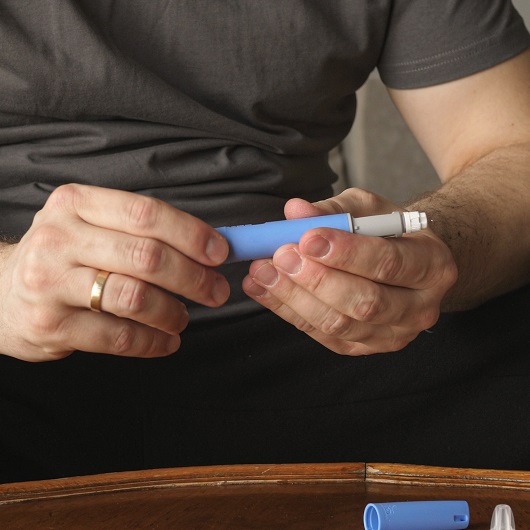How to Use Weight-Loss Medication Safely

January 22, 2024
These days, weight-loss medication is getting a lot of attention—on TV, on social media and in everyday conversations between family members and friends.
But talking about them is one thing, and taking them without a doctor’s guidance is another, says Karl W. Strom, M.D., medical director of the weight-loss program at Mountainside Medical Center.
What are these buzzed-about drugs with the generic name semaglutide?
What to Know About Weight-Loss Medication
The medications work by slowing the emptying of the stomach so you stay fuller longer. They do this by mimicking the chemical glucagon-like peptide-1 (GLP-1) that the small intestine produces to target gut hormone receptors. The drugs also alter brain receptors to cut the urge to eat.
This often helps people lose weight, but at what cost? A slowed transit through the gastrointestinal tract can cause reactions—some uncomfortable and others potentially dangerous.
“We’ve been seeing more and more side effects because people want to reach their goal faster and don’t follow proper protocols,” Dr. Strom says.
Potential side effects can include:
- Nausea
- Vomiting
- Cramps
- Heartburn
- Constipation
- Diarrhea
- Fatigue
Tips to Use Weight-loss Medication Safely
Dr. Strom offers seven tips on how to scale down without damage:
- Take Drugs at the Proper Pace
Doctors prescribe semaglutide in single-use syringes often injected at home. Patience is vital. The best approach is to raise weekly doses gradually to avoid aftereffects.
“It may take four to five months to reach the optimal dose,” Dr. Strom says. “But if taken correctly, semaglutide can help you lose weight successfully and healthily. That can change your life, physically and mentally, for the better.”
- Choose a Qualified Doctor
“Go to a weight-management doctor or bariatric surgeon who offers a comprehensive program with a multidisciplinary team,” Dr. Strom says. “They understand what it takes to help you reach your goal weight, they make sure you’re getting your proper nutrition, and they know how to limit side effects and manage them if they do occur.”
- Know that Injectables Aren’t for Everyone
Semaglutides focused on weight loss are not intended for those hoping to shed five to 10 pounds. They’re approved for people with a body mass index of 30 or higher, and people with a BMI of 27 or higher if they have weight-linked medical issues such as hypertension.
People with a personal or family history of thyroid cancer, pancreatitis (an inflamed pancreas) and gallbladder disease are at greater risk for serious complications and should not take weight-loss medication.
Though the U.S. Food and Drug Administration approved such drugs for ages 12 and up, some doctors won’t prescribe them for children. Rather than risk stunting their growth and bone-building, some physicians, including Dr. Strom, prefer to wait until children turn 18.
- Avoid Buying Injectables Online or from Compound Pharmacies
You may save money while getting a quicker fix, but neither you nor your health care practitioner may know what the compound contains—or the complications it can cause, Dr. Strom says. If you were denied a prescription for medical reasons, buying the drug anyway may endanger your health, especially if you don’t reveal that when seeking help for symptoms later on.
- Recognize that a Shot Is Not a Fix-All
While weight-loss drugs can help you drop pounds, they won’t necessarily affect your high cholesterol, hypertension, sleep apnea, diabetes or heart disease. “If you need to lose 100 pounds or more, bariatric surgery may be a better alternative since it can counter those diseases,” Dr. Strom says.
- Maintain Proper Nutrition
Without proper nutrition, you risk heart palpitations, vitamin deficiencies, nerve damage and hair loss. Your doctor can monitor your blood sugar, vitamin levels and electrolytes to ensure you get the nutrients needed to keep your heart, kidneys and other organs running smoothly.
- Develop Good Habits for Long-term Success
When you stop taking injectables, pounds may return. Your genes, environment and behavior all play a role in gaining and losing weight, Dr. Strom says.
That’s why you may need support from doctors, dietitians, trainers and even counselors to reduce fat, inactivity and emotional eating. “Success, confidence and better health are good side effects that come from a safe approach,” Dr. Strom says.
Signs You Need to See a Doctor
When taking weight-loss medication, talk to your doctor if you:
- Are constipated
- Are bloated
- Are dizzy
- Have abdominal pain
- Have other complications
- Are vomiting constantly and can’t tolerate food
“The latter may be a sign that your GI tract is not contracting, which is essential to moving food through it,” says Dr. Strom. “You also could become dehydrated, which could lead to kidney or heart problems.”
Go to the emergency room immediately if you have an allergic reaction, such as difficulty breathing, swelling of the throat swelling or all-over hives.
Next Steps & Resources:
- Meet our source: Karl W. Strom, M.D.
- To make an appointment with a bariatric surgeon near you, call 800-822-8905 or visit our website.
- Learn more about weight-loss services at Hackensack Meridian Health
The material provided through HealthU is intended to be used as general information only and should not replace the advice of your physician. Always consult your physician for individual care.






